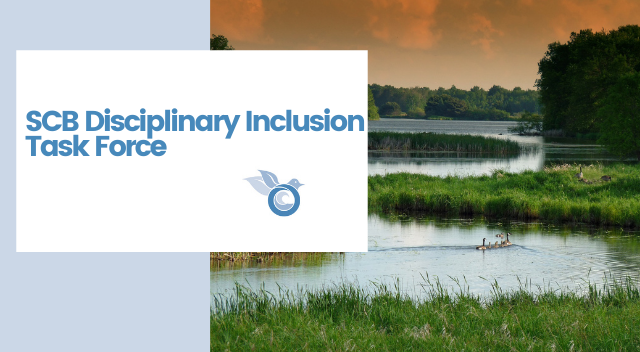
We are excited to introduce the Disciplinary Inclusion Task Force (DITF).
A core goal of the Society for Conservation Biology is to be a beacon to conservationists across the world. To that end, SCB recognizes the need to take stock of how the Society reflects the varied ways people enact conservation practice and scholarship, and to what extent it serves as that beacon. The legacy of the biological in lieu the humanities, local and indigenous knowledge, and social research is one of several issues related to the inclusion of different ways of thinking and disciplines the Society must address to plan its future. The Disciplinary Inclusion Task Force was approved in February 2020 to understand and enhance disciplinary inclusion and diversity in SCB.
To better understand our motivations and focus, the DITF’s story begins at NACCB 2018. A group of conference attendees were excited to learn of SCB’s growing equity, inclusion, and diversity efforts, yet realized to be truly inclusive attention to disciplines and ways of thinking was also necessary. Building on SCBs EID efforts, a group of 10+ members began brainstorming how SCB could best identify pathways for change. In December 2019, a proposal to form the DITF was submitted by the Board of Governors that outlined a formal task force to investigate how SCB could better serve conservationists from all disciplines, professions, and background.
DITF was formed in July 2020 and includes 16 members from various disciplines and experiences, which is overseen by a six-member steering committee. DITF will use qualitative, quantitative, and archival research methods to understand how SCB can best support its members from all disciplines while also expanding its membership to build a robust community of scientists and practitioners.
The DITF has three teams investigating different target populations. The Members Team aims to understand the SCB membership experience and how the Society can better support its current members. This team is currently conducting informational interviews and will launch a member-wide survey early next year. The Non-members Team is working to identify conservationists who are not SCB members to understand why that is, what those individuals look for in a professional society, and to what extent SCB does or could serve their interests. The Institutional History Team is conducting archival research and key informant interviews to understand how SCB’s past and institutional structure can help the DITF identify barriers to and pathways for change.
Our success needs your support; if you receive a communication from DITF, please reply. If you would like to have the opportunity to be interviewed, please sign up on our website.
To learn more about our work and team, visit our website or join the SCB Member’s Meeting on December 17 for a project update.